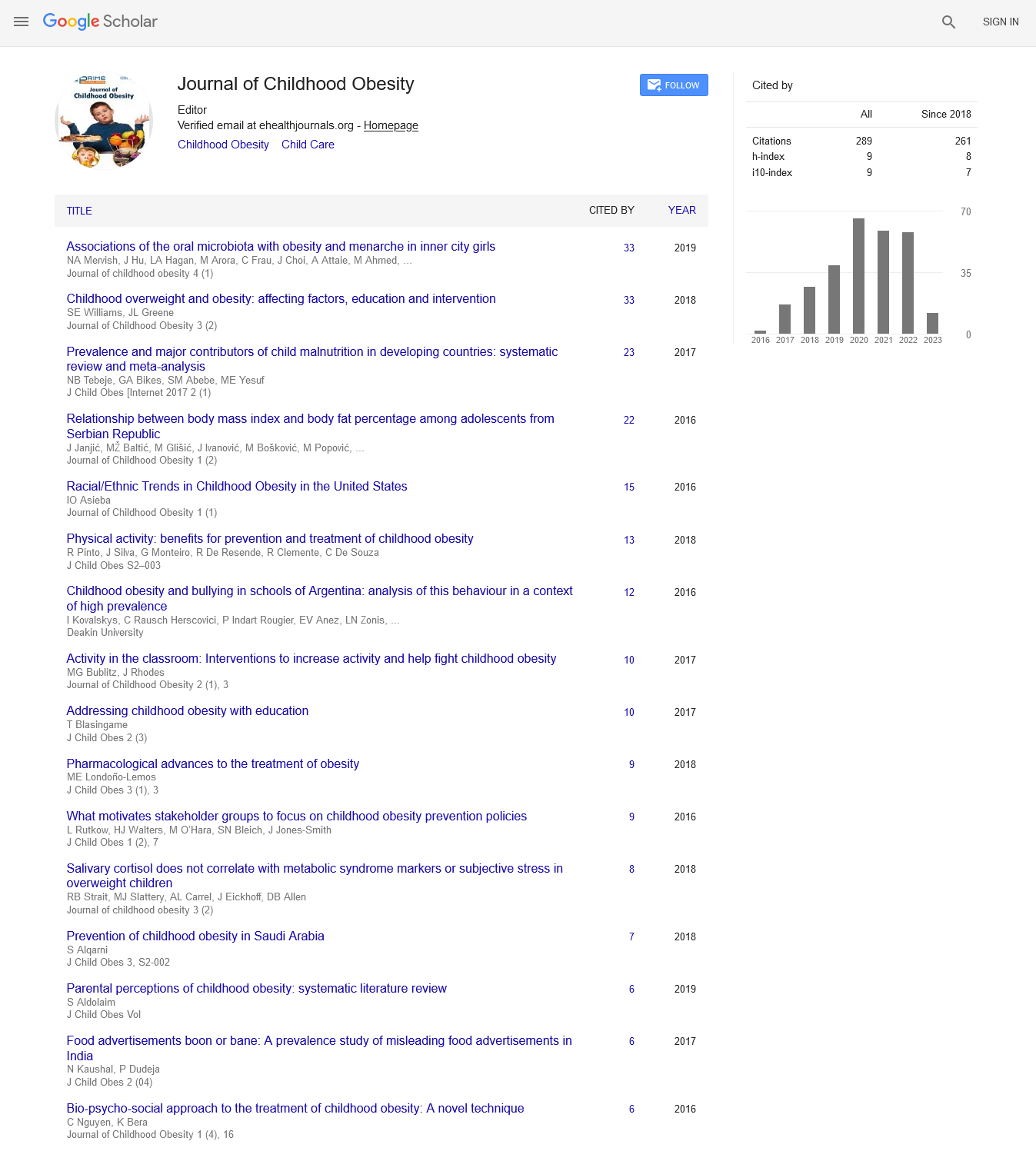Commentary - (2024) Volume 9, Issue 1
Neglecting a Child's Health under the Guise of Hereditary Fat Perpetuates Dangerous Narrative
Michelle Murphy*
Department of Child Obesity, University of Arizona, USA
*Correspondence:
Michelle Murphy,
Department of Child Obesity, University of Arizona,
USA,
Email:
Received: 31-Jan-2024, Manuscript No. ipjco-24-19168;
Editor assigned: 02-Feb-2024, Pre QC No. ipjco-24-19168 (PQ);
Reviewed: 16-Feb-2024, QC No. ipjco-24-19168;
Revised: 21-Feb-2024, Manuscript No. ipjco-24-19168 (R);
Published:
28-Feb-2024, DOI: 10.21767/2572-5394-24.9.05
Description
In the discourse surrounding child health, the conversation
often centers on lifestyle choices, nutrition, and physical activity.
However, an often overlooked factor contributing to childhood
obesity and subsequent health negligence is hereditary
fat. While genetics undoubtedly play a role in determining
body composition, using hereditary predispositions as a
justification for neglecting a child’s health can have detrimental
consequences. It’s imperative to understand the nuanced
interplay between genetic factors and environmental influences
to break the cycle of health negligence and prioritize the wellbeing
of our children. Hereditary fat, or familial predisposition
to obesity, refers to the genetic tendency for individuals to
accumulate excess body fat. Research has identified numerous
genetic variants associated with obesity, influencing factors
such as metabolism, appetite regulation, and fat storage.
While inheriting these genetic traits may predispose a child
to weight gain, they do not absolve parents or caregivers of
their responsibility to promote a healthy lifestyle. Neglecting
a child’s health under the guise of hereditary fat perpetuates
a dangerous narrative that undermines the importance of
preventive measures and intervention strategies. One of the
primary concerns associated with health negligence due to
hereditary fat is the increased risk of obesity-related health
complications. Children born into families with a history of
obesity are more likely to develop conditions such as type
2 diabetes, hypertension, and cardiovascular disease at a
younger age. The notion that genetics alone dictate a child’s
health trajectory disregards the role of environmental factors,
including diet, physical activity, and socioeconomic status, in
shaping overall health outcomes. By embracing a deterministic
mindset, caregivers may inadvertently exacerbate the
very health issues they seek to attribute solely to genetics.
Furthermore, overlooking the impact of environmental
influences on a child’s health perpetuates a cycle of inaction
and complacency. Rather than actively addressing modifiable
risk factors, such as poor dietary choices and sedentary
behavior, caregivers may resign themselves to the belief that
nothing can be done to alter the course of their child’s health.
This defeatist attitude not only undermines the child’s potential
for improved health but also perpetuates a sense of learned
helplessness that can hinder their ability to make positive
lifestyle changes in the future. Moreover, neglecting a child’s
health based on hereditary fat sets a dangerous precedent that
perpetuates stigma and discrimination. By attributing weight
gain solely to genetic factors, caregivers may inadvertently
reinforce harmful stereotypes and biases surrounding obesity.
This not only undermines the child’s self-esteem and body
image but also perpetuates societal misconceptions about
the complex nature of obesity. Rather than focusing on blame
or shame, efforts should be directed towards fostering a
supportive environment that promotes healthy behaviors and
empowers children to make positive choices regarding their
health. In conclusion, while hereditary factors undoubtedly
play a role in shaping a child’s predisposition to obesity, they do
not absolve caregivers of their responsibility to prioritize their
child’s health. Neglecting a child’s health under the guise of
hereditary fat perpetuates a cycle of inaction and complacency
that undermines efforts to address modifiable risk factors and
promote healthy behaviors. By adopting a holistic approach
that considers genetic, environmental, and behavioral factors,
we can break the cycle of health negligence and empower
children to lead healthier lives.
Acknowledgement
None.
Conflict Of Interest
The author’s declared that they have no conflict of interest.
Citation: Murphy M (2024) Neglecting a Child’s Health under the Guise of Hereditary Fat Perpetuates Dangerous Narrative. J Child Obesity. 9:05.
Copyright: © 2024 Murphy M. This is an open-access article distributed under the terms of the Creative Commons Attribution License, which permits unrestricted use, distribution, and reproduction in any medium, provided the original author and source are credited.

